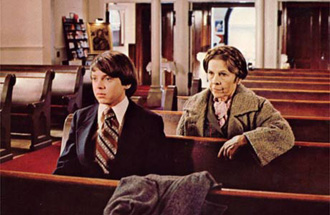Classic Movie Review: Harold and Maude
By Josh Spiegel
November 13, 2009
Where does quirk end and heart begin? I suppose that's a bit of a hacky way to consider that very specific type of independent-minded movie, one that isn't too realistic but has enough grounding to get you to relate to the characters. Moreover, how can you make sure that the emotion in one of these movies doesn't get overloaded into schmaltzy sentimentality? One of the directors who seems most intent on being as quirky as possible, whether or not it produces great films or middling ones, is Wes Anderson, he of the current stop-motion animated film Fantastic Mr. Fox. I would be shocked if, were he pressed, he wouldn't name one of his major influences as the 1971 quirkfest Harold and Maude.
By the way, don't let the word "quirkfest" fool you: I like quirkfests, and very much enjoyed Harold and Maude, a movie whose points could easily turn into the kind of sap that gets tossed out by studios in the empty months of February or August at the multiplexes. The basic idea in Harold and Maude is to learn to live life fully. The two title characters are a dour young man whose sole joy in life is concocting ridiculously elaborate fake suicides to hopefully get a reaction from his uber-wealthy and self-absorbed mother, and an elderly woman approaching 80 who has more zest for life than most people do. The latter teaches the former how to love what the world offers him, and in doing so, they fall in love.
Yes, I know, it's a strange hurdle to get over. To be fair to the filmmakers, the romance depicted between Harold and Maude is very chaste; though we see them kiss each other, it's never on the lips, and the one time they sleep together, all we see is the morning after. Sure, the movie could've gone all the way, but in some ways, seeing other characters react as some of us would (a priest who hears about this tells Harold, as viscerally and dramatically as possible, that the idea of these two people together makes him want to puke) makes the relationship seem more relatable. Sure, very few of us could claim to know two people as chronologically mismatched, but there's something about the two performers, Bud Cort and Ruth Gordon, that makes the whole thing work.
Harold and Maude has received something of a cult status since it was released in 1971 to tepid reactions (but then, how could it be a cult movie of any kind if it was wildly successful?); to be honest, the very existence of the film is an oddity. Forget the truly strange premise for one minute, and consider Cort and Gordon. The former is a pale, bug-eyed twentysomething whose most famous work was with Robert Altman, in M*A*S*H and Brewster McCloud; the latter had won an Oscar for her supporting role in Rosemary's Baby and, along with her second husband, co-wrote some of the more famous Tracy-Hepburn comedies, basing them on her marriage. Though they both worked with A-Listers, it's hard to imagine these two equaling box office in any executive's eyes.
Continued:
1
2




